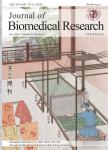Cardioprotective activity of alcoholic extract of Tinospora cordifolia (Willd.) Miers in calcium chloride-induced cardiac arrhythmia in rats
Cardioprotective activity of alcoholic extract of Tinospora cordifolia (Willd.) Miers in calcium chloride-induced cardiac arrhythmia in rats作者机构:Department of PharmacologyGyan Vihar School of PharmacySuresh Gyan Vihar UniversityJagatpuraJaipur (Rajasthan)302025India Delhi Institute of Pharmaceutical Sciences & ResearchDepartment of PharmacologyPushpviharSector Ⅲ.New Delhi 110017India
出 版 物:《The Journal of Biomedical Research》 (生物医学研究杂志(英文版))
年 卷 期:2011年第25卷第4期
页 面:280-286页
学科分类:1002[医学-临床医学] 100201[医学-内科学(含:心血管病、血液病、呼吸系病、消化系病、内分泌与代谢病、肾病、风湿病、传染病)] 10[医学]
主 题:Tinospora cordifolia arrhythmia cardioprotection.
摘 要:The present study investigated the antiarrhythmic activity of alcoholic extract of Tinospora cordifolia (T. cordifolia) in CaCl2 induced arrhythmia. CaCl2 (25 mg/kg) was administered by intravenous infusion (iv) to produce arrhythmia in rats. The animals were then treated with T. cordifolia extract (150, 250, and 450 mg/kg) and verapamil (5 mg/kg,iv). Lead II electrocardiogram was monitored. Plasma calcium, sodium and potassium levels were measured. In CaCl2 induced arrhythmia, heart rate was decreased by 41.10%, T. cordifolia at 150, 300, and 450 mg/kg decreased the heart rate by 26.30%, 29.16%, and 38.29%, respectively, and verapamil reduced the heart rate by 9.70% compared to the normal group. The PQRST waves were normalized and atrial and ventricular fibrillation was controlled in rats treated with verapamil and T. cordifolia. CaCl2 increased calcium and sodium levels and decreased potassium levels in blood. T. cordifolia dose-dependently decreased calcium and sodium levels and increased potassium levels. Hence, T. cordifolia can be used in antiarrhythmic clinical settings and beneficial in atrial and ventricular fibrillation and flutter and may be indicated in ventricular tachyarrhythmia.



